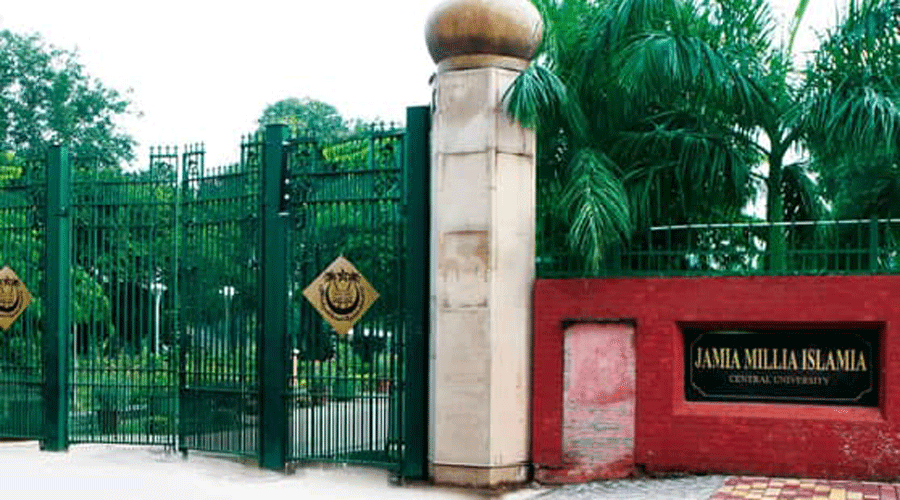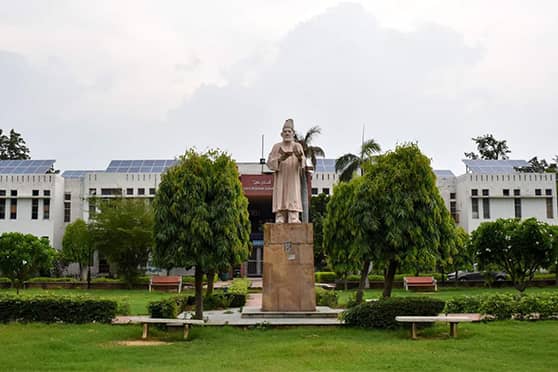Most first-year undergraduate and postgraduate students of Jamia Millia Islamia began a boycott of their online classes on Monday, demanding reopening of physical classes amid a widespread feeling that the Centre wants them to stay away from a campus it deems troublesome.
Some commentators had earlier expressed fears elsewhere that autocratic regimes could misuse the so-called post-Covid “new normal”, marked by fewer face-to-face interactions and chances to mobilise public opinion, to put a lid on dissent.
Jamia had in 2019 been one of the hubs of the protests against the Citizenship Amendment Act (CAA) and witnessed a violent police raid on the campus. The Narendra Modi government has taken a stance against the minority character of the central university in a continuing court case.
All the central universities and IITs and most state-level universities have reopened in-person classes for all batches, but Jamia has resumed physical classes only for final-year undergraduate and postgraduate students.
The South Asian University (SAU) is the other Delhi institution not to have resumed offline classes but an official said this was because flight restrictions would till recently have prevented its large number of foreign students from returning to India.
A senior Jamia professor told The Telegraph the protests and the police action on the campus had been bad publicity for the government, and it therefore wanted to keep as many students out of the university premises as it could.
“They may keep this up as long as they can. If another round of Covid comes, they might again suspend all the classes,” the professor said.
Gate No. 7 at Jamia had witnessed continuous anti-CAA protests in December 2019. The same month, Delhi police — who report to the Union home ministry — entered the hostels and library and allegedly beat up students. The police claim that some of the protesting students were involved in violence.
A student said he and many of his peers had chosen Jamia, which reserves half its seats for Muslims, over reputable universities in their states because they wanted exposure to the national capital and all it represents. They were also attracted by the reputation of the Residential Coaching Centre at the university.
“Now we are suffering for that decision,” he rued.
An email to Jamia vice-chancellor Najma Akhtar asking why physical classes were not being held for all students and seeking her reaction to the charge of government pressure has brought no response.
The Modi government’s paranoia about anti-CAA protesters is reflected also in its dealings with the National Council for Promotion of Urdu Language, a government body.
The government did not allow the council to hold its annual World Urdu Conference in February 2020, apparently fearing possible anti-CAA sloganeering by some participants. Since then, the event has been held online.
Many second-year undergraduate students at Jamia, who too are being denied physical classes, have joined the online-class boycott that is expected to continue this full week before the students conduct a review on Sunday.
The Jamia students being denied physical classes have also been barred from the campus library, which is a key grievance.
“The (worst of the) pandemic is over and there are no restrictions on offline classes (in the country) now. But our university is open only for final-year students. This is discriminatory,” a student said, asking not to be quoted.
Another student said senior teachers had privately acknowledged government pressure not to reopen physical classes for all the batches.
“We have submitted a memorandum to the university to start physical classes for us. Online classes cause huge problems — many students lack the required devices and Internet connectivity is poor in many areas. But the university has been silent on our demand,” a first-year student said.
An official at the SAU — half of whose students come from other Saarc countries —said all classes were still being held online because of the restrictions on international flights till March 27. He said the university would soon take a decision on resuming physical classes.












